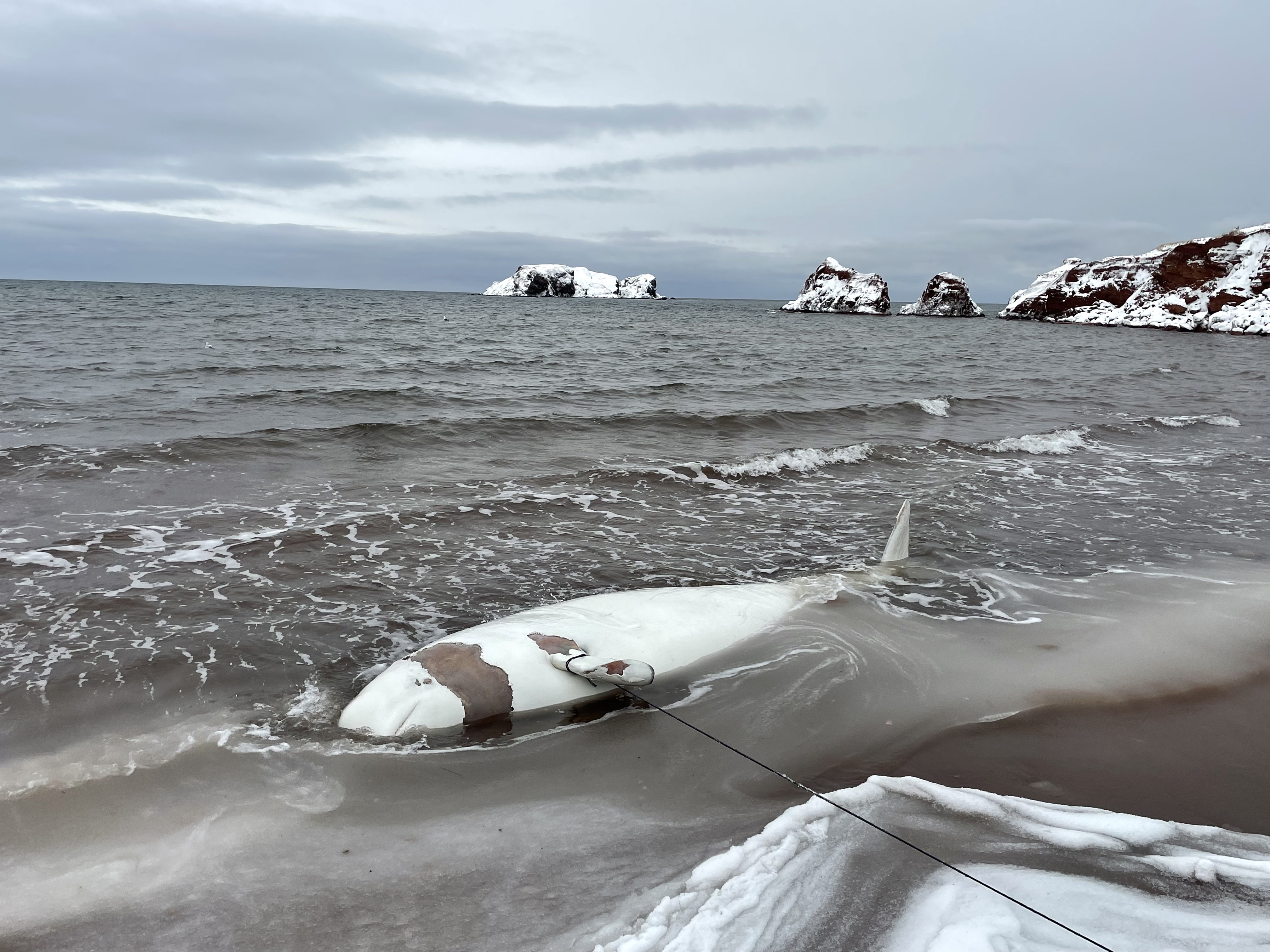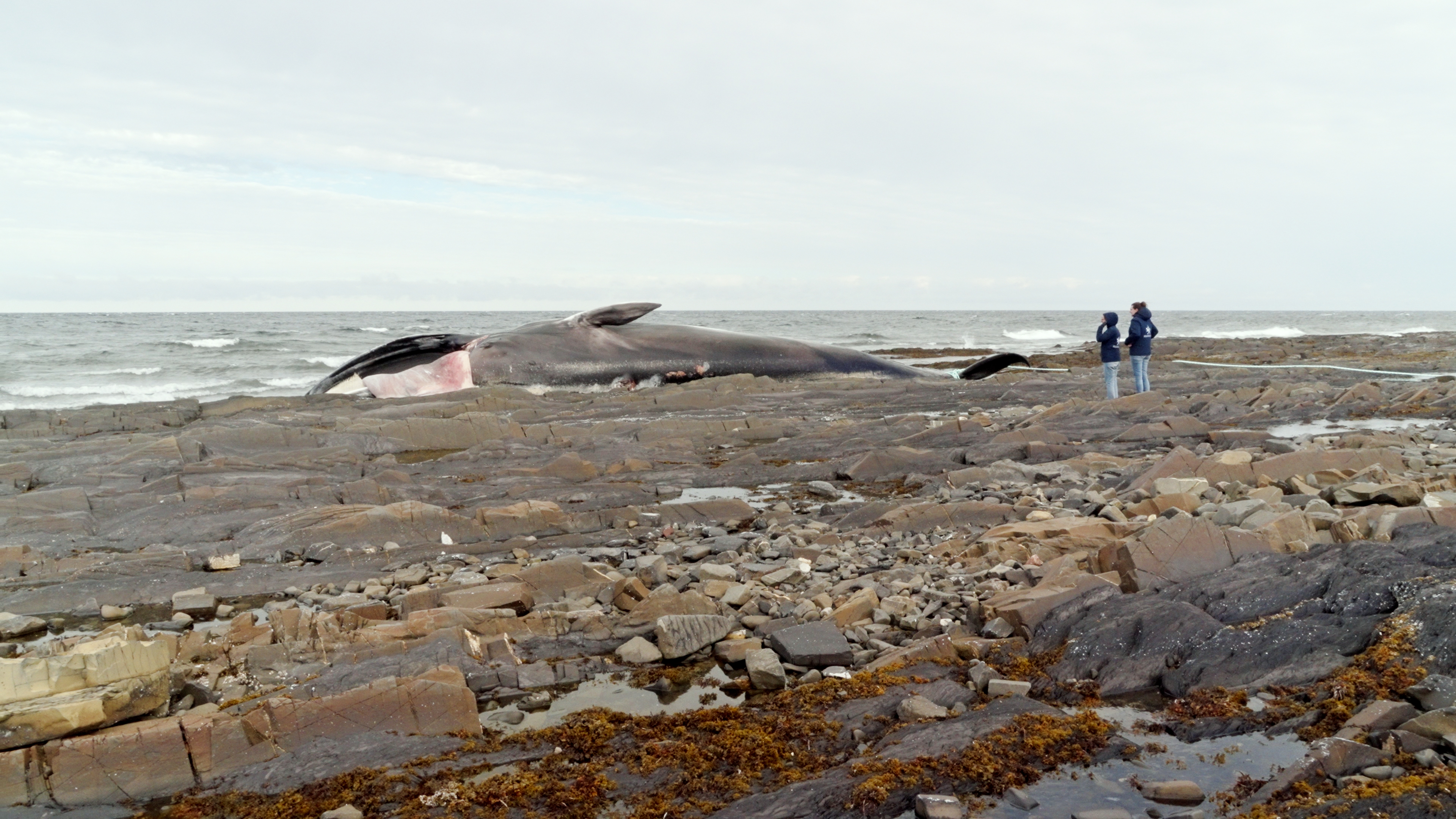In the Gaspé
“It was so big…even from miles away, I thought it was an island!” These are the words of René Roy, a Mingan Island Cetacean Study (MICS) collaborator who was solicited on Tuesday to document a carcass that had been reported drifting off of Percé earlier that morning. Fishery officers on air patrol had contacted 1-877-7baleine when they thought they had spotted a floating blue whale. Mr. Roy, who was already at sea, set out for the site. A few metres from the giant, he discerns that it is a male rorqual, its ventral pouch fully swollen by putrefaction gases. The whale measures about 15 m long. Its skin is dark; the underside side of the tail is white. Indeed, the shape of the pectoral fin suggests that of a blue whale, but the animal does not show the typical colour pattern of this species, namely dark blue mottling on a pale gray background. How can we determine the species with certainty? A unique criterion in the fin whale is its asymmetric pigmentation. The lower right mandible is cream-coloured, while the rest of the body is dark gray. This asymmetry also affects the pigmentation of the baleen and the ventral grooves. Mr. Roy’s description and photos are conclusive: the cetacean floating in the swell of the Gulf is a fin whale.
Mr. Roy was quick to notice a deep gash on the rorqual’s peduncle and injuries to its tail. These cuts, in addition to the horizontal stripes on the whale’s belly, suggest entanglement. No fishing gear was found on the body of the animal. This fin whale has not been reported since June 30. If you spot it beached or drifting at sea, please report it promptly to 1-877-7baleine.
Update, July 3, 3 pm: the fin whale was seen again by Mr. Roy this morning at 11 am, still drifting, this time off the coast of Forillon National Park. It seemed to be drifting out toward the sea and thus away from the Gaspésie coastline.
Update, July 6: René Roy reported the carcass washed up on the shores of Forillon National Park this Saturday, July 4. The carcass is in the Cap Bon-Ami sector, an area closed off to visitors. The animal is accessible only by sea. Marco Cotton, a seasoned kayaker of the Gaspé region, agreed to go and document the incident on Sunday at dawn. He approached the fin whale to photograph the injuries presumably left by ropes. No fishing gear was present on the body of the whale, however. The whale will not be moved or recovered for the time being. Samples were taken from the animal at sea on June 30 and visual documentation has been completed. If baleen were present, they could also be sampled. At this time it is impossible to say, as the behemoth is lying on its back and it was not possible to approach the head. The carcass is likely to wash away with the tide and be reported adrift once again. To be continued!
Lower North Shore
Marine Mammals Emergencies does not often receive calls from the Lower North Shore, but on June 23, residents of La Tabatière reported the presence of a whale stranded on Île Harris behind Île du Gros-Mécatina. Residents of Gros-Mécatina cooperate generously: a request is made to the population and in no time photos are published on the social networks; it is a male humpback. As the site lies at the edge of the research area used by partners interested in collecting samples, it is difficult to go gather scientific data from the whale. We hope to obtain photos of the underside of the tail to identify the individual, but as the whale is immersed, this proves to be impossible. The rorqual is no longer on the shores of the island. It could therefore be reported again in the region.





